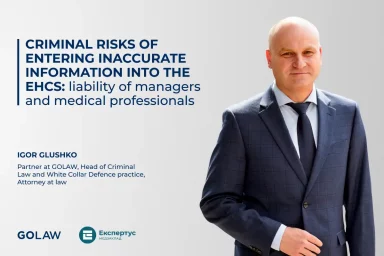Tax residency: determining and changing residency status
With the introduction of the rules on controlled foreign companies, tax residency status becomes an important issue for Ukrainian individuals.
For foreigners living in Ukraine for a long period of time, tax residency is also an issue to consider because the state will treat them as Ukrainian tax residents by default. Not everyone is aware that one’s Ukrainian residence status affects the need to pay taxes on worldwide income in Ukraine, subject to the requirements established by any applicable double tax treaty (DTT). In this article we will analyse the key issues to consider to properly determine tax residency status.
It is important to distinguish tax residency and citizenship, as these are two different concepts. It does not necessarily mean that being a citizen of Ukraine protects you from taxation in other countries and vice versa. Any country’s residency – based taxation system defines the individuals’ place of leaving, the center of the vital interest to tax the individual’s income.
In order to define a person as a Ukrainian tax resident, a number or criteria are used. The first is the place of actual leaving. If the person simultaneously resides in another country, then the permanent place of leaving (home) shall be considered.
If individuals have a permanent place of leaving in different countries, they are deemed to be residents of Ukraine if they have close personal and economic relations (centre of vital interests) in Ukraine. A sufficient, but not exclusive, condition for determining the individual’s centre of vital interest is the place of permanent leaving of the individual’s family members or the individual’s registration as a private entrepreneur.
If the centre of vital interests cannot be determined, or if the individual has no permanent place of leaving in any country, then such an individual shall be recognized as a resident of Ukraine if he or she stays in Ukraine for at least 183 days during the tax year.
If the residency status cannot be determined based on the above-mentioned rules, the individual shall be recognized as a resident of Ukraine on a citizenship criterion.
It should be noted that the mentioned above criteria apply to both Ukrainian citizens and foreigners who are temporarily or permanently leaving in Ukraine. When it comes to cross-border tax questions, including double residence, one should pay attention to DTT rules. In other words, to correctly determine the person’s tax residence one shall also be guided by the provisions of DTT.
DTT is used in situations when one person can be recognized as a resident in several countries under their domestic tax law and there is a need to remove double taxation. DTT provides a similar mechanism of tax residency determination as was described above. To determine the residential status of an individual, one needs to determine the permanent home, centre of vital interests, habitual abode and nationality. When an individual is a national of both states or neither of them, the question shall be solved by mutual agreement between the states according to the procedure laid down in the DTT.
It is necessary to mention that there is no legal procedure in Ukraine that allows an individual to change, acquire or abandon the residency status. Usually, Ukrainian tax authorities consider all citizens to be tax residents. However, if there are grounds (e.g. permanent place of leaving, centre of vital interests, 183 days rule) that prove that an individual has no relation to Ukraine except citizenship the following action can be taken:
- Request for individual tax ruling. It is possible to ask the tax authorities about their position regarding the tax resident status of the person. Note that if the person acts in accordance with the individual tax ruling and violates tax legislation no fines may be imposed on such a person.
- Challenge an individual tax ruling in court. If the tax authorities come to the wrong conclusion in the tax ruling, a person has a right to challenge it in court. During the court proceedings, the person’s proper tax residency status can be determined. After this, if there are no significant changes in the initial data the person may rely on such a court decision while determining the tax residency status.
For foreigners, it also may be beneficial to become a tax resident of Ukraine, because there is no progressive tax rate and the personal income tax is only 18% plus military duty 1,5%. This is relatively low in comparison with other European countries.
If such a foreigner submits a tax declaration in Ukraine showing his or her Ukrainian and global income, Ukraine’s tax authorities will take him or her as a tax resident.
Even after fulfilling all the requirements of the legislation on recognition as a resident of Ukraine there may be some discrepancies in the tax legislation of a foreigner’s nationality state and Ukraine.
Therefore, each case should be considered separately considering the actual circumstances of a person’s life and business activity.

Tetiana Fedorenko
Senior Associate, Attorney at law
- Contacts
- 31/33 Kniaziv Ostrozkykh St, Zorianyi Business Center, Kyiv, Ukraine, 01010
- t.fedorenko@golaw.ua
- +380 44 581 1220
- Recognitions
- ITR World Tax 2026
Sign up to be aware
New achievements are inspired by information. GO further, don’t miss out GOLAW news and legal alerts
Our expertise
-
- Energy and Natural Resources
- Antitrust and Competition
- Banking and Finance
- Compliance, Corporate Governance and Risk Management
- Corporate and M&A
- Criminal and White Collar Defence
- Defense in Anti-corruption procedures and regulations
- Digital Economy Practice
- Labor and Employment
- Natural Resources and Environment
- Government Relations (GR)
- Insolvency and Corporate Recovery
- Intellectual property
- International trade
- Legal support of business and private Сlients in Germany
- Litigation and dispute resolution
- Private clients
- Real Estate and Construction
- Restructuring, Claims and Recoveries
- Martial Law
- Tax and Customs
-
- Agribusiness
- Aviation
- Chemical industry
- Engineering, Construction and Building Materials
- Environment and Natural Resources
- Financial institutions
- IT and AI
- Industry and manufacturing
- Healthcare industries, Life sciences and Pharmaceuticals
- Media, Entertainment, Sports and Gambling
- Retail, FMCG and E-Commerce
- Transport and Logistics
We use cookies to improve performance of our website and your user experience.
Cookies policy
Cookies settings







